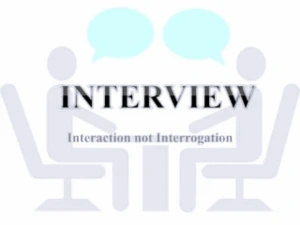Master the tips and tricks for acing any interview like a pro, and with ease. This guide unveils secrets and common pitfalls to avoid to land your dream job.

Meaning Of An Interview
An interview, in its simplest form, is a structured conversation between two or more people, typically with a specific purpose. In most common usage, it refers to a one-on-one interaction where an interviewer asks questions and an interviewee responds, usually to assess the interviewee’s suitability for a job, course of study, or other opportunity.
Here’s a breakdown of the meaning of an interview from different perspectives:
For the interviewer:
- Evaluation: An interview is a tool to gather information and assess the interviewee’s qualifications, skills, and potential fit for a specific role or program.
- Selection: It is a key step in the selection process, helping to identify the best candidate among a pool of applicants.
- Information gathering: Interviews allow the interviewer to learn more about the interviewee’s background, experiences, and motivations beyond what’s written on a resume or application.
Related: Study Abroad Visa Interview: Navigating The Application Process
For the interviewee:
- Opportunity: An interview is a chance to showcase their skills, experience, and suitability for the desired position or program.
- Assessment: It is an opportunity for the interviewee to assess the company, role, or program and see if it aligns with their own goals and interests.
- Learning experience: Interviews can be valuable learning experiences, providing feedback on their communication skills, ability to answer questions, and overall presentation.
Related: Language Immersion: Mastering a New Tongue
Overall:
- Information sharing: During an interview, both parties exchange information and learn from one another.
- Decision-making: It is essential to make educated judgments about recruiting, admissions, and other opportunities.
- Human connection: Despite its structured nature, an interview can also serve as a human connection, allowing both sides to assess the possibility of a beneficial working relationship or partnership.
The meaning and aim of an interview can vary depending on the situation. However, the core principle stays the same. It’s a structured discourse geared at acquiring information, judging suitability, and, eventually, making educated judgments.
Related: Staying Connected Using Technology

The Secret To A Successful Interview
While there’s no single “secret” to guarantee interview success, there are key ingredients that significantly increase your chances of achieving it. Here’s a combination of strategic steps and mindset shifts that can unlock your interviewing potential:
Preparation is Paramount:
- Deep-dive research: Immerse yourself in the company’s mission, values, current projects, and recent news. Understand the specific role and its requirements thoroughly. This demonstrates genuine interest and allows you to tailor your responses to their needs.
- Master the STAR method: Practice answering common interview questions using the STAR method (Situation, Task, Action, Result). This ensures your responses are clear and concise, and showcases your achievements with impact.
- Craft insightful questions: Go beyond generic inquiries easily found online. Formulate thoughtful questions about the company culture, team dynamics, and responsibilities that demonstrate your genuine interest and deeper understanding.
- Plan your attire and logistics: Dress professionally and appropriately for the company culture. Arrive early to avoid stress and project respect for their time.
- Gather materials: Bring copies of your resume, portfolio, and references (if requested) to be prepared and organized.
Related: Study Abroad Reflection: International Students’ Experiences

Mindset and Communications:
- Confidence is key: Believe in yourself and your capabilities. Maintain a cheerful and enthusiastic attitude throughout the interview. Remember that they are interviewing you, but you are also interviewing them to determine if it is a good fit.
- Active listening and clear communication: Pay close attention to each inquiry before responding. Speak clearly and simply, emphasizing the important issues and avoiding rambling.
- Highlight your worth: Use concrete examples from your previous experiences to demonstrate your talents and achievements, as well as how they apply to the specific post. Always try to quantify your impact.
- Engage in a two-way conversation. To better understand the company culture, team dynamics, and position duties, ask insightful questions. Demonstrate your genuine interest in the position and company.
- Professionalism and etiquette: Keep a good posture, minimize fidgeting, and use appropriate words. Thank the interviewer for their time, and reconfirm your interest in the post.
Related: Online International Education: Exploring Virtual Learning
Bonus Tip:
- Be yourself: Authenticity is critical. Allow your individuality to shine through while retaining professionalism.
- Practice your elevator pitch: This is a brief 30-second review of your talents and expertise that you can easily provide when asked, “Tell me about yourself.”
- Prepare for probable challenges: Be prepared to answer common interview questions such as pay expectations or gaps in your experience.
- Send a thank-you email within 24 hours, indicating your continued interest and reinforcing the major issues you covered.
- It isn’t only about answering questions correctly. It’s about making a good first impression, highlighting your value offer, and proving your suitability for the role and corporate culture.
Related: Online International Education: Exploring Virtual Learning

Common Pitfalls To Avoid During An Interview
Even the most qualified candidate may misstep during an interview. To assist you avoid typical pitfalls and shine in your next opportunity, here are some critical areas to keep an eye on:
Preparation:
- Not researching the company and role: A lack of understanding about the organization, its values, and the specific role demonstrates a lack of enthusiasm and effort.
- Inadequate practice: Being unprepared for common questions or not having thoughtful questions can make you appear nervous and unengaged.
- Unprofessional attire: Dressing inappropriately for the company culture creates a negative first impression.
Related: Studying Abroad Packing List: Essentials For International Students
Communication and Body Language:
- Negative body language: Slouching, fidgeting, or making poor eye contact can convey disinterest or nervousness.
- Rambling or going off on tangents: Sticking to the question and providing concise, relevant answers is crucial.
- Being overly negative or complaining: Avoid negativity about previous employers, colleagues, or personal issues.
- Using unprofessional language or swearing: Maintain a professional demeanor throughout the interview.
Related: Student Housing Options: Finding Your Home Abroad

Answering Questions:
- Lying or exaggerating your skills and experience: Honesty and integrity are essential, and any discrepancies can be easily found.
- Focusing on weaknesses without showcasing how you’re addressing them: Acknowledge weaknesses honestly, but emphasize how you’re actively working to improve.
- Not quantifying your achievements: Use numbers and data to demonstrate the impact of your work whenever possible.
- Asking generic or unprepared questions: Show genuine interest and research by asking insightful questions specific to the company and role.
- Not sending a thank-you email: Expressing gratitude for the interviewer’s time and reiterating your interest is crucial.
- Forgetting key details about the interview: Take notes during the interview to remember important information you can reference in your thank-you email.
- Being impatient or following up excessively: Be respectful of the interviewer’s time and follow up once after a reasonable timeframe.
Related: International Schools vs. Local Schools: A Parent’s Guide
Additional Tips:
- Arrive early to avoid stress and demonstrate respect for the interviewer’s time.
- Turn off your phone and avoid distractions during the interview.
- Be mindful of your time and try not to interrupt the interviewer.
- Be yourself and let your personality shine through while maintaining professionalism.
Interviews are a two-way street. While you’re being evaluated, you’re also assessing the company culture and fit for your career goals. By avoiding these common pitfalls and focusing on showcasing your skills, enthusiasm, and professionalism, you can increase your chances of landing your dream job.
Related: Resources For Students With Disabilities: Special Education Admission

Where To Place Your Hands During An Interview
While there is no single “correct” position for your hands during an interview, there are certain tips to increase your comfort and make a good impression. Here are a few things to remember:
General guidelines:
- Avoid extremes: Do not entirely cover your hands or make excessive hand gestures that may distract the interviewer.
- Maintain a calm and natural posture: Tense hand positions can indicate anxiousness, so try to keep your hands comfortable and natural.
- Be aware of cultural norms: Think about any cultural context that may influence expectations for hand placement during an interview.
Related: International Student Insurance Options For Studying In The U.S
Specific Suggestions:
Resting positions:
- Folded in your lap: A classic option that projects calmness and professionalism. Avoid gripping your hands tightly together.
- One hand on your lap, the other on the armrest (if seated): Creates a slightly open posture while maintaining control.
- Loosely clasped in front of you: Can convey confidence and attentiveness.
- Gesture sparingly: Use hand gestures naturally to emphasize key points, but avoid excessive or nervous movements.
- Be mindful of fidgeting: Avoid tapping your fingers, clicking pens, or other nervous habits that can be distracting.
- Adapt to the conversation: If the interviewer uses hand gestures, you can mirror their energy subtly to create rapport.
Related: Teaching Abroad: Your Path To An International Educational Career
Additional Tips:
- Practice beforehand: Rehearse your interview responses while paying attention to your hand placement. This can help you feel more comfortable and natural during the actual interview.
- Pay attention to the interviewer’s reactions: If they seem uncomfortable with your hand position, subtly adjust to something else.
- Focus on the overall impression: Remember, your hand placement is just one aspect of your body language. Project confidence, enthusiasm, and professionalism through your entire demeanor.
By following these suggestions and focusing on overall comfort and naturalness, you can ensure your hand placement doesn’t hinder your interview performance and allows you to make a positive impression.
Related: UNESCO’s Role In Shaping Global Education Policies

Typical Interview Questions And Responses
I can offer advice on creating compelling replies to frequently asked job interview questions, even though I am unable to supply precise solutions that would work in every situation:
- Adjust your responses to the particular job description and organization. Emphasize your experiences and abilities that are directly related to the job.
- To organize your responses, use the STAR approach (Situation, Task, Action, Result). Clearly state the situation, justify your actions, and indicate the relative importance of your accomplishments.
- Be sincere, upbeat, and passionate. Present your credentials and strong points while maintaining your sincerity and modesty.
Related: International Baccalaureate (IB) Program: A Global Education Perspective
Here are some common questions and approaches for crafting your responses:
General Questions:
- Tell me about yourself: Briefly introduce yourself, highlighting relevant skills and experiences. Connect them to the specific role and company.
- Why are you interested in this position?: Express your genuine passion for the position and the company. Mention specific aspects that align with your career goals and values.
- Why should we hire you?: Clearly articulate your unique value proposition. Highlight skills and achievements that directly address the company’s needs.
- What are your biggest strengths and weaknesses?: Choose strengths relevant to the position. Be honest about a weakness, but emphasize how you’re working on improving it.
- In five years, where do you see yourself? Exhibit ambition and career aspirations that complement the company’s opportunities for expansion.
- Have you got any inquiries for us? Prepare thought-provoking questions regarding the role’s responsibilities, team dynamics, or business culture. This demonstrates your diligence and your curiosity.
Related: International Students’ Mental Health Support
Knowledge and Abilities:
- Give an example of a challenge you faced and how you overcame it. Select a scenario that calls for the necessary abilities. Pay attention to your resilience, initiative, and problem-solving skills.
- Tell me about a project you were involved in that you are proud of: Highlight your successes and your input to a group project. Whenever feasible, quantify the outcomes.
- How would you describe your teamwork abilities? Please provide concrete examples of teamwork and dispute resolution in past roles.
- What are your most notable accomplishments in your prior role(s)? Highlight achievements that indicate the skills and characteristics required for the new position. Use data and analytics to measure your influence.
- Can you provide an example of when you had to acquire a new skill quickly? Show your adaptability and eagerness to learn. Explain how you dealt with the difficulty and the favorable outcome.
- How do you deal with pressure and tight deadlines: Share an experience in which you skillfully controlled pressure. Improve your organization, prioritization, and time management abilities.
Related: International Education Trends: Adapting To A Changing World

Company and Role-Specific Questions:
- Why are you interested in our company?: Do your research. Highlight specific aspects of the company culture, values, or mission that resonate with you.
- What do you know about our products or services?: Demonstrate knowledge of the company’s offerings and how they align with your skills and interests.
- What are your thoughts on our company culture?: Research the company culture and express your genuine fit with it. Share any relevant experiences from previous roles.
- Why are you leaving your current job?: Focus on positive reasons for seeking a new opportunity. Avoid negativity or bad-mouthing previous employers.
- What unique skills or experiences can you bring to our team?: Highlight specific skills and experiences that make you stand out from other candidates. Connect them directly to the company’s needs.
Related: International Student Exchange Programs: Expanding Horizons Through Education
Additional suggestions:
- Practice your responses out loud. This increases fluency and confidence.
- Consider possible follow-up questions. Be prepared to elaborate on your responses.
- Maintain good body language. Make eye contact, smile, and express confidence.
- Express appreciation for the interview. Thank the interviewer for their time, and reconfirm your interest in the post.
The key is to be genuine, ready, and passionate. Understanding the rationale behind typical interview questions and producing well-structured solutions will improve your chances of securing your ideal job.
Related: Gamification Of Learning: Engaging Virtual Reality For Immersive Experiences
Conclusion
While interviews can be stressful, remember that they are an opportunity to demonstrate your abilities and enthusiasm. By using these strategies and methods, you may turn your interview fear into confidence and get the job you deserve. Know that preparation is essential, so put in the time and effort, and you’ll be well on your way to interview success.

